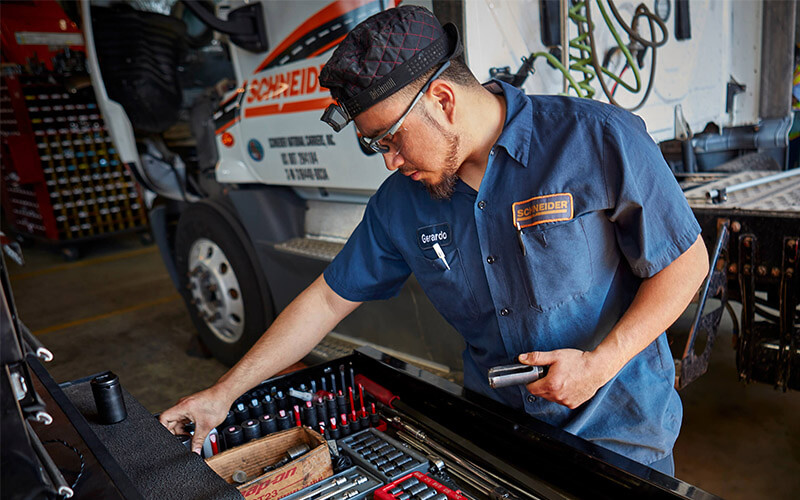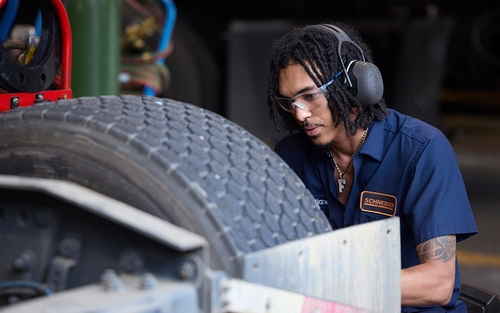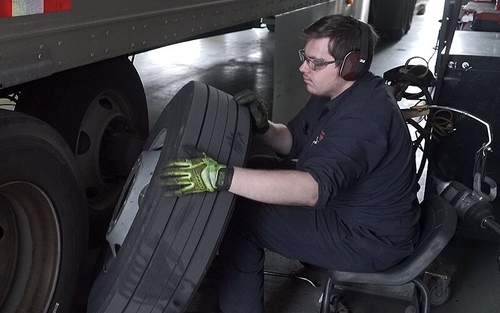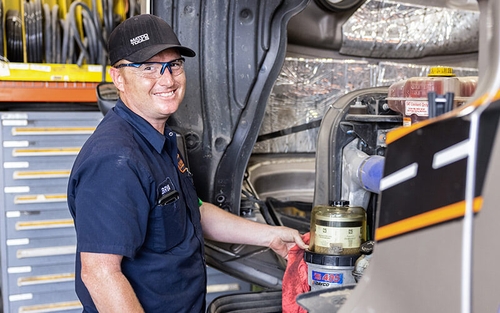Diesel technician working conditions, hours and routine


By The Schneider Guy
Estimated reading time: 3 minutes
If you're searching for a career where you can exercise your mechanical skills, the diesel industry is full of opportunities.
Schneider employs skilled diesel technicians to maintain and repair our large fleet of semi-trucks. Our maintenance team plays a key role in ensuring our business runs smoothly.
Here, we provide some insight into the working conditions and daily life of a diesel technician to help you understand if this is the right fit for your lifestyle and career goals.
What are the working conditions for a heavy equipment technician?
Diesel technicians work inside a shop or outside with a service truck
Most diesel technicians work in a shop alongside other team members. Shop environments are typically noisy from:
- Diesel engines.
Power and air tools.
Forklifts.
Other heavy-duty equipment.
Some technicians travel offsite to work on equipment. For example, Schneider's mobile diesel technicians work outside, performing repairs at customer sites, distribution centers and rail yards.
Diesel technicians must emphasize workplace safety
A technician may be exposed to several potentially hazardous conditions on a day-to-day basis, including:
- Flammable materials.
Hot surfaces.
Live electrical wiring.
Noxious fumes.
Safety has always been a key focus area at Schneider. Our shops perform safety inspections on a weekly and monthly basis, and all technicians complete an on-the-job safety program.
Most diesel technicians, including those at Schneider, also get access to various types of Personal Protective Equipment (PPE) that is provided by their company such as:
- Face shields and safety glasses.
Welding helmets and welding jackets.
Bump caps.
Gloves, of multiple varieties.
Knee and elbow pads.
Reflective vests or uniforms.
Fall protection.
Diesel technicians perform physically demanding work
A career in or outside the shop can be labor-intensive and requires a certain level of physical strength. Technicians are often tasked with lifting heavy equipment and must use various tools, including:
- Torque wrenches.
Pliers.
Drills.
Screwdrivers.
Repairs often involve standing or reaching in awkward and sometimes uncomfortable positions to work on equipment.
How many hours do diesel technicians work?
The average diesel technician works full time or about 40 hours each week.
Many shops provide 24-hour maintenance and repair services. That means first-, second- and third-shift opportunities, weekend shifts and overtime hours are readily available to diesel technicians.
A lot of diesel technician work hours often follow a standard five-day week with eight-hour shifts. However, at Schneider, most diesel technician hours are four-day weeks with 10-hour shifts.
What is a typical day for a diesel technician?
1. Complete work tasks.
Diesel technician job duties usually include tasks such as:
- Completing preventative maintenance and inspections on tractor systems, such as fuel, engine, transmissions, electrical, brakes, steering, drivelines and tires.
Completing preventative maintenance and inspections on trailer systems, such as brakes, electrical, suspension and body work.
Performing express-related services like changing oil and tires.
Working with computer systems to build, track and complete repairs on equipment.
Utilizing a forklift to unload, stock and pick up parts.
Communicating with customers about repair updates, wait times and reasons for repair decisions.
Schneider diesel technicians, for example, often split their time between completing preventive maintenance services and handling repair work.
2. Take a lunch break.
Many diesel technicians are paid by the hour, which typically means they must incorporate a lunch break into their schedule. At Schneider, most diesel technicians take a 30-minute lunch break.
3. Receive ongoing training.
Since equipment and technology are continuously advancing, it’s essential for diesel technicians to stay up to date on the best ways to work on complex systems.
Receiving on-the-job training could look like:
- Taking a few hours out of your shift to watch instructional videos from the original equipment manufacturer (OEM) about a new engine system.
Having a lead diesel technician walk you through how a truck’s new tech system works and showing you how to repair it.
4. Finish up the day.
As a diesel technician wraps up their shift, they can expect to see the next group of maintenance workers starting theirs. They may be asked to walk through any outstanding work that needs to be done before heading out for the day.
Interested in becoming a diesel technician?
Follow these steps to jumpstart your maintenance career and discover what it takes to become a diesel technician.

Schneider Guy loves the "Big Orange." He's passionate about the trucking industry and connecting people to rewarding careers within it. He's been the eyes and ears of our company since our founding in 1935, and he's excited to interact with prospective and current Schneider associates through "A Slice of Orange."



